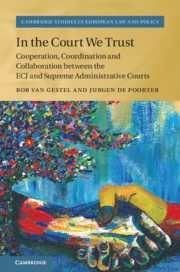 In the Court We Trust
In the Court We Trust Published online by Cambridge University Press: 28 November 2019
This chapter provides an overview of the debate on the idea of a judicial dialogue, in particular with regard to what this concept could mean for the preliminary reference procedure. It shows that ‘dialogue’ means different things in different contexts but almost never does there seem to be an actual exchange of ideas and opinions between courts about what is supposed to be a correct interpretation of the law. Sometimes courts are referring to each other’s case law to borrow arguments or study the impact of a certain choice of law in another jurisdiction but closer forms of cooperation and collaboration are quite rare. What most inter-judicial communications have in common, though, is a quest for legitimacy. This could also be the purpose of dialogue in the preliminary reference procedure (1) by offering input from national courts to the CJEU in order to come up with the best-reasoned interpretation of EU law; (2) by providing a platform for participation in the process of judicial law making for all the member of the interpretative community and( 3) thereby building a common identity between the EU and national legal orders which is necessary in a multilevel and pluralist legal order.
To save this book to your Kindle, first ensure no-reply@cambridge.org is added to your Approved Personal Document E-mail List under your Personal Document Settings on the Manage Your Content and Devices page of your Amazon account. Then enter the ‘name’ part of your Kindle email address below. Find out more about saving to your Kindle.
Note you can select to save to either the @free.kindle.com or @kindle.com variations. ‘@free.kindle.com’ emails are free but can only be saved to your device when it is connected to wi-fi. ‘@kindle.com’ emails can be delivered even when you are not connected to wi-fi, but note that service fees apply.
Find out more about the Kindle Personal Document Service.
To save content items to your account, please confirm that you agree to abide by our usage policies. If this is the first time you use this feature, you will be asked to authorise Cambridge Core to connect with your account. Find out more about saving content to Dropbox.
To save content items to your account, please confirm that you agree to abide by our usage policies. If this is the first time you use this feature, you will be asked to authorise Cambridge Core to connect with your account. Find out more about saving content to Google Drive.